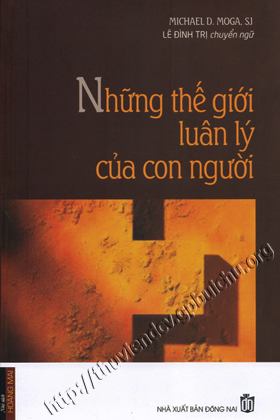
| Introduction to phenomenology | |
| Tác giả: | Dermot Moran |
| Ký hiệu tác giả: |
MO-D |
| DDC: | 142.7 - Hiện tượng luận trong triết học |
| Ngôn ngữ: | Anh |
| Số cuốn: | 2 |
Hiện trạng các bản sách
|
|
||||||||||||||||||||||||||||||||
» Thêm vào danh sách tác phẩm yêu thích
| Preface | xiii |
| Acknowledgements | xvii |
| List of abbreviations | xix |
| Introduction | 1 |
| Phenomenology and twentieth-century European philosophy | 1 |
| What is phenomenology? | 4 |
| The origins of the term 'phenomenology ’ | 6 |
| Phenomenology in Brentano | 7 |
| The presuppositionless starting point | 9 |
| The suspension of the natural attitude | 11 |
| The life-world and being in the world | 12 |
| Phenomenology as the achievement of knowing | 14 |
| The structure of intentionality | 16 |
| Philosophy and history | 17 |
| Phenomenology in France | 18 |
| Conclusion | 20 |
| 1. Franz Brentano: descriptive psychology and intentionality | 23 |
| Introduction: exact philosophy | 23 |
| The Brentano school | 24 |
| Brentano: life and writings (1838-1917) | 26 |
| Brentano’s philosophical outlook: empiricism | 33 |
| Brentano’s theory of wholes and parts | 36 |
| Brentano’s reform of logic | 37 |
| Descriptive psychology | 39 |
| Inner perception | 41 |
| Inner perception as additional awareness | 43 |
| The tripartite structure of mental life | 45 |
| Presentations and modifications of presentations | 46 |
| The intentional relation | 47 |
| Distinction between physical and psychical phenomena | 52 |
| Twardnwski's? modification of Brentanian descriptive psychology | 55 |
| Brentano and Husserl | 59 |
| 2. Edmund Husserl: founder of phenomenology | 60 |
| Introduction: an overview of Husserl and his philosophy | 60 |
| Husserl’s central problem: the mystery of subjectivity | 60 |
| Husserl as perpetual beginner | 62 |
| The stages of Husserl’s development | 65 |
| Husserl: life and writings (1859-1938) | 67 |
| A leader without followers | 89 |
| 3. Husserl’s logical Investigations (1900-1901) | 91 |
| Introduction | 91 |
| The composition of the Logical Investigations | 91 |
| The ideal of science as a system of evident cognitions | 94 |
| The Prolegomena (1900) 99 | 99 |
| Psychologism | 101 |
| The six Investigations and the 'breakthrough' to pure phenomenology | 105 |
| A brief survey of the six Investigations | 109 |
| The First Logical Investigation | 110 |
| The Fifth Logical Investigation | 113 |
| The Sixth Logical Investigation | 118 |
| Realism and idealism in the Logical Investigations | 121 |
| 4 . Husserl’s discovery of the reduction and transcendental phenomenology | 124 |
| Introduction | 124 |
| Phenomenology as a presuppositionless science 126 | 126 |
| Husserl's principle of principles 127 | 127 |
| The absolute self-givenness of our mental acts 129 | 129 |
| Phenomenology an eidetic not a factual science 132 | 132 |
| Eidetic seeing (Wesenerschauung) 134 | 134 |
| Husserl's transcendental turn 136 | 136 |
| David Hume as a transcendental philosopher 139 | 139 |
| The critique of naturalism 142 | 142 |
| The epoché and the reductions 146 | 146 |
| The epoché and scepticism 148 | 148 |
| Breaking with actuality 152 | 152 |
| Imaginative free variation | 154 |
| Tile iwetic-noematic structure of experience | 155 |
| Problems with the reduction 160 I'he horizon | 161 |
| 5. Husserl and the crisis of the European sciences | 164 |
| Introduction 164 164 166 168 | 164 |
| Tile notion of constitution | 164 |
| Static and genetic constitution | 166 |
| The transcendental ego | 168 |
| Intersubjectivity and the experience of the oi/ier (Fremderfahrung) | 175 |
| The Crisis of European Sciences: the investigation of the life-world | 179 |
| The life-world | 181 |
| The origin of geometry | 186 |
| Husserl’s achievement | 186 |
| 6. Martin Heidegger’s transformation of phenomenology | 192 |
| The enigma of Heidegger | 192 |
| The question of being | 195 |
| Heidegger: life and writings ( 18S9-1976) | 200 |
| The political implications of Heidegger’s philosophy | 219 |
| 7. Heidegger’s Being and Time | 222 |
| Introduction: the road to Being and Time | 222 |
| The review of Karl Jaspers' Psychology of World Views | 223 |
| Heidegger's Aristotle interpretation | 225 |
| Heidegger’s critical appropriation of Husserl | 226 |
| Readiness to hand (Zuhandenheit) and presence at hand (Vorhandenheit) | 233 |
| Expression (Aussage) | 234 |
| Heidegger’s fusion of phenomenology with hermeneutics | 234 |
| The hermeneutical structure of the question | 236 |
| The hermeneutical circle | 238 |
| The nature of Dasein | 238 |
| Authenticity and inauthenticity | 238 |
| Anxiety and being-towards-death | 240 |
| Mood and state of mind (Befindlichkeit) | 241 |
| Mitsein | 242 |
| Transcendental homelessness | 243 |
| Heidegger’s influence | 245 |
| 8. Hans-Georg Gadamer: philosophical hermeneutics | 248 |
| Introduction: an overview of Cadamer's philosophy | 248 |
| The classical legacy | 250 |
| The tradition of understanding | 252 |
| Philosophy as dialogue | 253 |
| Hans-Georg Gadamer (1900-): life and writings | 254 |
| Gadamer on the Greeks and the Germans | 268 |
| The importance of language | 269 |
| The tradition of hermeneutics | 271 |
| Hermeneutics in Dilthey and Heidegger | 276 |
| Truth and Method (1960) | 280 |
| Language and world | 282 |
| Gadamer’s influence | 283 |
| 9. Hannah Arendt: the phenomenology of the public sphere | 287 |
| Introduction: Hannah Arendt as philosopher | 287 |
| Arendt: life and writings (1906-1975) | 292 |
| The Human Condition | 306 |
| Arendt’s contribution | 316 |
| 10. Emmanuel Levinas: the phenomenology of alterity | 320 |
| Introduction: ethics as first philosophy | 320 |
| Emmanuel Levinas: life and writings (1906-1995) | 322 |
| Levinas and phenomenology | 327 |
| The role of philosophy | 329 |
| The religious dimension of Levinas's thought | 330 |
| Early writings | 332 |
| A defence of subjectivity | 341 |
| The face to face | 347 |
| Levinas’s influence | 350 |
| 11. Jeau-Paul Sartre: passionate description | 354 |
| Introduction: the engage intellectual | 354 |
| Sartre's philosophical outlook | 356 |
| Jean-Paul Sartre: life and writings (1905-1980) | 363 |
| Post-war politics | 374 |
| The Transcendence of the Ego (1936) | 376 |
| L’Imaginaire (1940): the phenomenology of imagining | 379 |
| Being and Nothingness (1943): phenomenological ontology | 385 |
| Sartre's influence | 390 |
| 12. Uwirice Merleau-Ponty: the phenomenology of perception | 391 |
| Introduction: a philosophy of embodiment | 391 |
| Maurice Merleau-Ponty: life and writings (1908-1961) | 391 |
| A phenomenology of origins | 401 |
| Merleau-Ponty’s intellectual background | 406 |
| The critique of reductionism in The Structure of Behaviour (1942) | 412 |
| Phenomenology of Perception (1945) | 417 |
| The role of sensation in perception | 420 |
| One'sown body (Le corps propre) | 423 |
| The body as expression | 425 |
| Merleau-Ponty’s later philosophy | 427 |
| The metaphysics of contingency | 430 |
| Merleau-Ponty’s influence on contemporary philosophy | 430 |
| 13. Jacques Derrida: from phenomenology to deconstruction | 435 |
| Intioduction-neither philosophy nor literature | 435 |
| Jacques Derrida: life and writings (1930--) | 437 |
| Deconstruction and morality | 442 |
| Derrida and the end of philosophy | 444 |
| The- critique of Husserl’s The Origin of Geometry | 446 |
| Logocentrisiu | 448 |
| Deconstruction: ‘more than one language' | 450 |
| The world as text: “there is no outside-text" | 453 |
| Derrida's engagement with Husserlian phenomenology | 456 |
| Derrida’s debt to Heidegger | 461 |
| The influence of structuralism: de Saussure and Lévi-Strauss | 461 |
| The nature of ‘différance’ | 463 |
| Skelcli of a history of différance | 467 |
| Différence and the trace | 469 |
| Derrida and religion | 469 |
| Derrida’s contribution to twentieth-century philosophy | 471 |
| Notes | 475 |
| Bibliography | 519 |
| Index | 550 |







